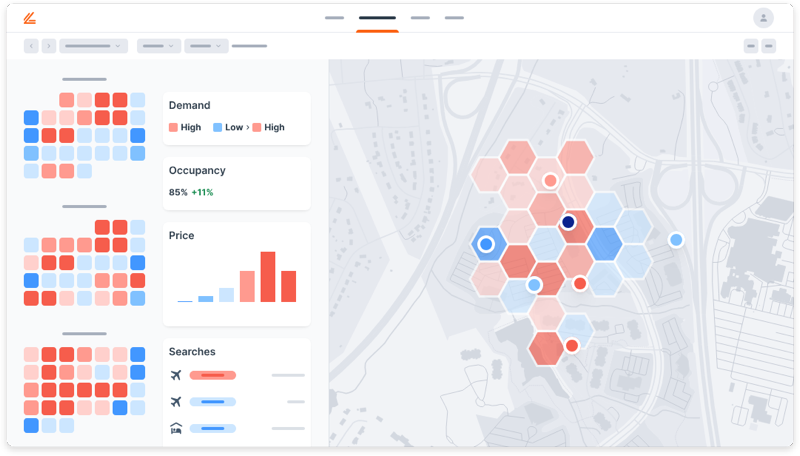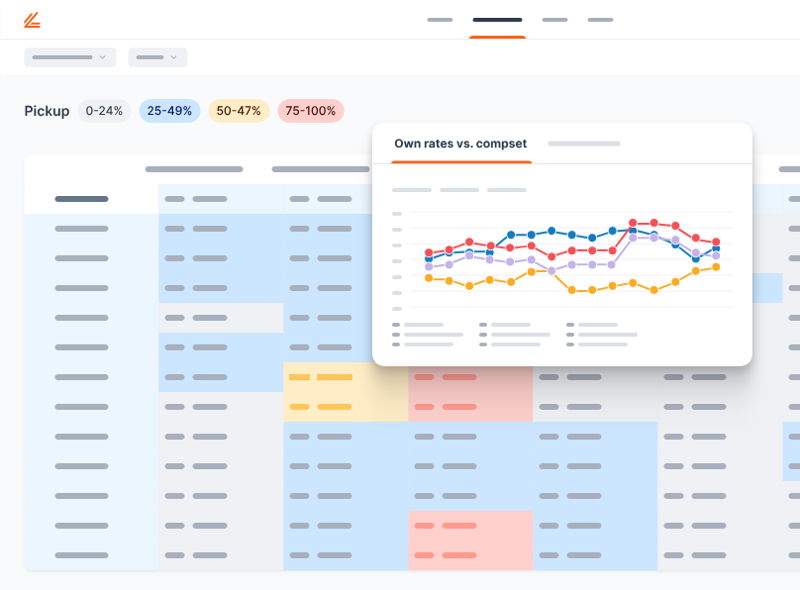Budget season in hotels is a critical time for revenue management. It’s a period when important decisions are taken that can impact the overall performance and financial success of the hotel over the next year. In this article, we’ll outline five key pieces of technology you should prioritize for the upcoming budgeting season.
The budgeting process for hotels usually begins around August. This intensive time period requires careful consideration of many commercial and operation aspects. These include staffing levels, forecasting demand, room revenue projections and pricing strategy.
In the midst of your planning, you will find that the global economic environment presents you with a unique set challenges. This underscores the importance of making strategic investments in IT to ensure success in the industry.
Budget season is a good time to consider the current economic and politic climate
The current economic climate has generated significant uncertainty, including potential downside risks, arising from factors like evolving government policies. ongoing trade disputesGeopolitical instability and. The budgeting and financial planning becomes more complex. fluctuating demand patterns Travelers are becoming more price sensitive.
In times of economic recession, the dynamics of competition within the hospitality industry shift. Hoteliers at different service levels compete for a smaller customer base.
Due to the increased competition, a decline in market demand, and more demanding customers regarding pricing, you need sophisticated tools that can provide real-time insight into market conditions.
You can then implement the right revenue strategies, while preserving the perceived quality and value of your hotel.
This article will highlight five essential technology items that you should prioritise during the budgeting season.
1. Predictive demand intelligence
Accurate prediction of future market demand This is the foundation of a successful revenue management strategy. It allows you to accurately predict booking patterns and optimize pricing strategies.
By using predictive demand intelligenceUsing this information, you will be able to gain insight on when and where travelers are searching for flights and accommodations.
You can make adjustments to your prices, target marketing campaigns at specific feeder markets that show the most intent, and create customized offers to take advantage of anticipated periods of high demand, as well as stimulate bookings in slower times, by having a detailed understanding of future demands.
This method has been proven more reliable than using only historical data. This is especially true in the rapidly changing world of today, where demand patterns are not always as they used to be. The COVID-19 Pandemic showed the limitations in using historical data to predict the future.
It is impossible to overstate the importance of accurate forecasting, which underpins all commercial decisions in a hotel. One of the most notable benefits of this predictive ability is that it allows hotels to optimize their prices by implementing dynamic rates Automatically adjusts to changes in guest demand.
This will maximize revenue during high-demand seasons, and encourage bookings in periods of low demand.
This approach to pricing ensures that your prices are not too low or too high, ultimately increasing overall profitability.
Industry-leading solutions like Market Insight You can capture the hotel booking intent of your customers in real time through analysis of search data that is looking forward. This will reveal market trends and unexamined revenue opportunities.
Market Insight has several key features which give you an advantage. There are several features, including heat maps for market demand and accurate data about flight searches, stay patterns and hotel searches. This allows you to create more comprehensive strategies that cater to demand.

2. With rate intelligence, you can gain a better understanding of the pricing strategies used by competitors
Revenue managers who want to achieve maximum revenue for their properties must keep a close eye on the pricing of competitors.
It is difficult to capture market share and effectively position rates when you are constantly trying to stay on top of the various channels.
Dynamic nature Online Travel Agencies The increasing number of Flash Sales and Limited-Time Offers (such as OTAs) makes manual tracking near impossible.
Airbnb, Vrbo and other platforms are competing with hotels for the same clients.
In times of economic instability, competitors’ pricing can become even more aggressive. This makes real-time intelligence essential. Rate intelligence tools are essential for revenue managers to help them with this crucial task.
Rate Insight The software provides real-time information on hotel and short term rental rates. It also offers granular insight into the current, past and future prices, their ranking, their online reputation, their occupancy levels, and their online reputation.
Rate Insight allows you to track room rates and compare them with other promotional activities, such as cancellation policies, length of stay discounts and exclusives. mobile rates.
Understanding the promotional levers used by competitors can provide valuable insight into how they respond to market conditions. You can then adjust your promotional activities in order to remain competitive.
3. Direct booking tools reduce the reliance on OTAs.
You’ve probably experienced a situation in which you lose revenue due to high OTA fees and struggle to build direct relationships.
Many Hotels rely heavily on OTAs for bookingsThey are sacrificing a large portion of their income in commissions. To build brand loyalty, and to encourage repeat business you will need a powerful marketing strategy. direct booking strategy.
A strong direct booking tool can help counter this. Economic uncertainty may make hotels more reliant upon OTAs and increase commission costs.
Encourage guests to engage in a variety of activities. book directlyYou can drastically reduce the costs of commissions associated with OTAs, and develop more lasting and meaningful relationships with guests. This encourages loyalty and repeat customers.
The use of personalized direct booking tools has become a powerful tool that can enhance your online booking experience. The tools customize your hotel website to each visitor by showing them messages and offers tailored to their preferences and browsing behaviors. This leads to an increase in direct reservations and conversion rates.
The Hotels Network (THN) offers a number of tools to help personalize your online booking experience, such as price comparison widgets and reviews widgets.
You can gain a thorough understanding of guest preferences, expectations, and behaviors by analyzing data from multiple sources.
You can tailor your offers, make room recommendations and even add in-room amenities for a more compelling and relevant booking experience. This will lead to a higher level of guest satisfaction, and an increased likelihood that they’ll book directly.
4. Dynamic upsells can increase the total revenue per available room.
You don’t want the demand to be low to lose out on opportunities to increase revenue.
You can also use this as a way to get in touch with your local community. upselling Many cross-selling initiatives rely on inefficient manual processes.
Hotels can significantly increase their revenues and profits by using dynamic upselling technologies. Total Revenue Per Available Room (TRevPAR), by strategically offering guests relevant upgrade and additional services during their booking journey.
Upselling initiatives, such as offering early check-in and late checkout options or spa treatments, are most effective when they are personalized to the guest’s preferences.
The vouchers are presented to the customer at a convenient time, for example immediately following confirmation of their booking or just before they arrive.
Hotels can increase ancillary revenues and enhance guest satisfaction by tailoring upsells to guests’ individual needs.
If a guest has booked a room that offers a city-view, they may be upgraded to an upper floor with an even larger panorama.
Canary Technologies You can demonstrate this technology in a number of ways, such as by enabling the hotel to offer guests relevant amenities and add-ons during key touchpoints like post-booking and pre-check-in.
It is important to ensure that revenue opportunities are captured at every stage of the customer journey.
5. Business Intelligence for data-driven revenue optimization
You want to make sure you’re not wasting money by identifying which strategies work and which don’t.
Data from hotel systems such as PMS, RMS, CRM and others is fragmented.Hotel data is often fragmented and scattered across multiple systems, including PMS, CRM, RMS etc. This makes it difficult to identify trends or understand performance.
Business Intelligence Platforms (BI) have become essential tools for many hotel revenue management professionals, as they serve as central hubs which consolidate data coming from both internal and external resources.
These platforms convert raw data to actionable insights. They empower revenue managers to take informed decisions, which optimize revenue and improve operational efficiency in the entire property.
Lighthouse Business Intelligence It is a good example of a platform that offers features like a comprehensive overview of room and non-room revenue, AI-powered daily performance summaries and customizable reports.
A holistic view of hotel financial health will allow you to identify areas for improvement and strengths, as well as make data-driven choices that will contribute to the long-term success of your hotel.
The value of BI platforms is not limited to budget season. They enable revenue managers to analyze historic performance data including key metrics such as occupancy rates and Average Daily Rates (ADR), along with market conditions.
This analysis allows for more realistic and achievable financial targets for the coming year. It eliminates the need for manual data collection and analyses, and improves the accuracy of the budget forecasting.

Budget season success: Strategic technology investment
Your hotel’s success will be determined by the investments you make in technology.
The tools described in this blog are essential for optimizing revenues, improving efficiency, and ensuring profitability at your hotel.
Data-driven decision making can help you to both weather economic challenges and capitalize on new opportunities.
You can increase your revenue, improve the guest experience, and achieve financial success by carefully evaluating these technologies and implementing them.
Please contact us to find out more about our Lighthouse Commercial Platform and industry-leading data. get in touch.

Jonathan Gough
Jonathan Gough, Content Team Lead for Lighthouse, is responsible for all content marketing. Jonathan Gough has spent over a ten-year marketing career dedicated to travel, hospitality and tourism. Jonathan is passionate to leverage Lighthouse’s technology and help lodging professionals grow their businesses.
Lighthouse
Lighthouse (formerly OTA Insight) is the leading commercial platform for the travel & hospitality industry. We convert complexity into confidence through actionable insights, business analytics, and price tools that maximize revenue. We continuously innovate to offer the best platform that allows hospitality professionals to measure performance better, price more effectively and understand the markets in new ways.
Lighthouse is trusted by 65,000 hotels across 185 countries. It’s the only solution to provide real-time information on short-term and hotel rentals. We are committed to providing the best customer service and delivering an unmatched experience. We treat our customers as true partners. Their success is ours.
This article was originally published on Lighthouse.


